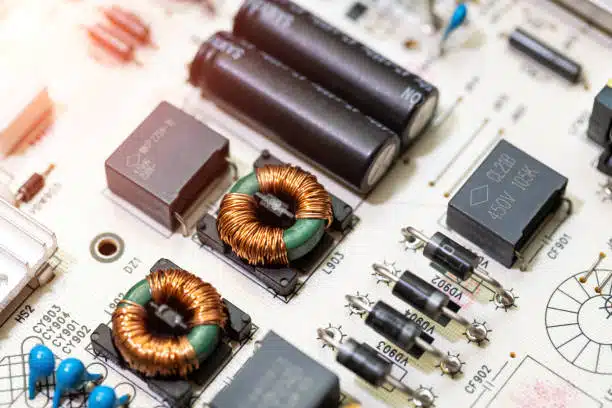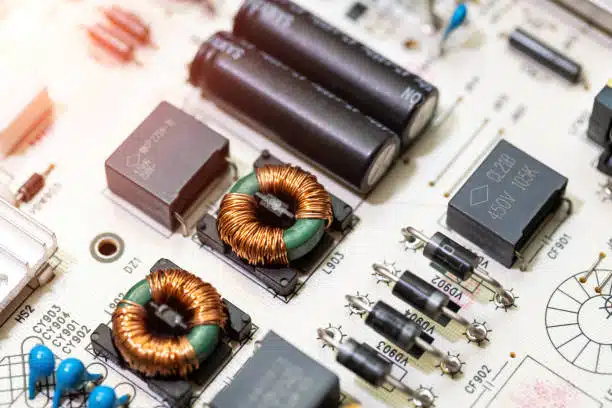
Capacitors play a vital role in shaping modern infrastructure. They enhance energy efficiency, improve reliability, and support sustainability across diverse applications. For instance, capacitor banks have demonstrated their ability to reduce utility bills by over 30% for manufacturers. The growing demand for high-capacity capacitors, projected to increase at a CAGR of 23% from 2024 to 2029, highlights their importance in meeting energy needs. Capacitors – Infrastructure solutions are indispensable in maintaining voltage stability and ensuring uninterrupted power supply. Understanding how capacitor works reveals their ability to optimize power systems and minimize energy losses.
The capacitor banks market, valued at $10.53 billion in 2023, underscores the significance of capacitors in achieving energy-efficient and reliable systems.
Key Takeaways
-
Capacitors save energy by cutting power losses in systems. This lowers bills and makes systems work better.
-
In green energy setups, capacitors keep extra energy and steady the grid. This helps keep power steady during changes.
-
Capacitors help machines work better by boosting motors and using less energy. This saves money on running costs.
-
In cities, capacitors help power buses and trains and improve communication. They support eco-friendly city growth.
-
More people need capacitors because they help update systems and save energy.
Capacitors in Energy Systems
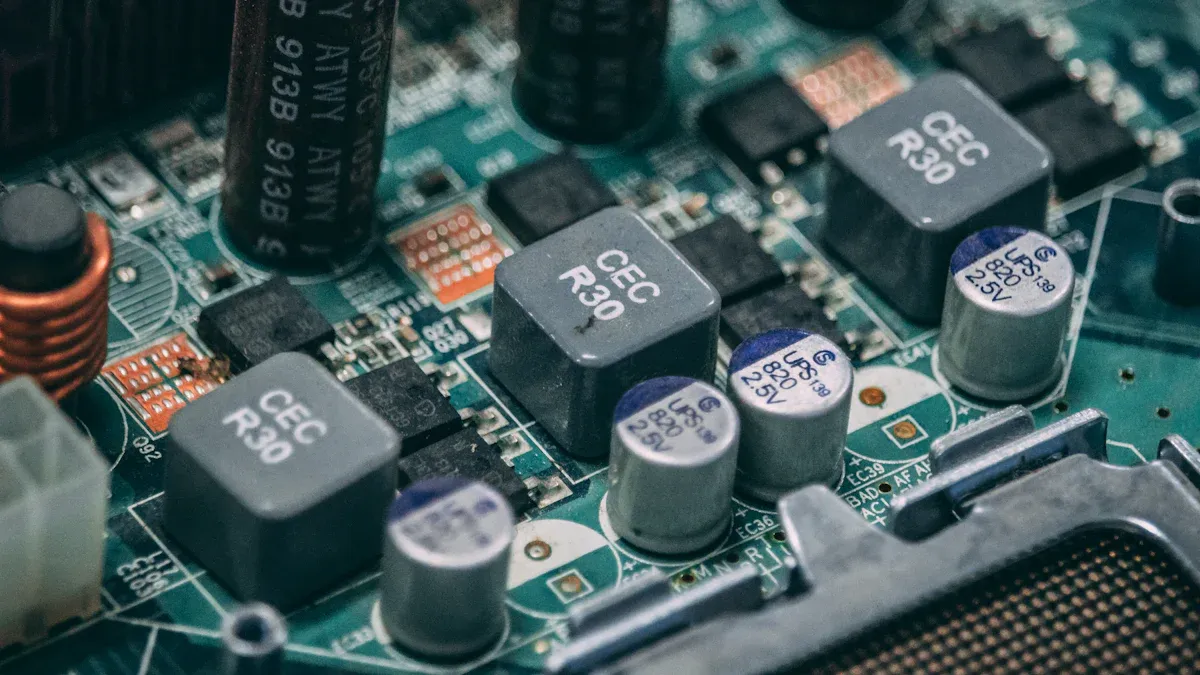
Capacitors are essential components in modern energy systems. They enhance efficiency, improve reliability, and support the integration of advanced technologies. Their role spans across power generation, distribution, energy storage, and voltage regulation, making them indispensable in industrial and urban infrastructure.
Power Generation and Distribution
Capacitors play a critical role in power generation and distribution systems. They store and discharge electrical energy, which helps stabilize voltage levels and improve power factor. This ensures that electrical systems operate efficiently and reliably. Power capacitors compensate for reactive power, reducing energy losses and enhancing the performance of distribution networks.
The Transmission & Distribution Electric Capacitor Market, valued at USD 11.4 billion in 2023, highlights the growing demand for capacitors in modernizing aging electrical infrastructure. This market is expected to grow at a rate of 6.3% from 2024 to 2032, driven by rising energy demand and the need for efficient power systems. Capacitors are vital for maintaining grid stability, especially as countries expand their transmission networks to meet increasing energy needs.
Capacitor bank placement optimization has shown significant improvements in operational metrics. For instance, the MOPSO algorithm achieved a 43.43% reduction in voltage deviation, a 50.00% reduction in peak demand, and a 12.21% reduction in power losses. These results demonstrate the effectiveness of capacitors in enhancing power system efficiency.
Renewable Energy Storage and Grid Stabilization
Capacitors as energy storage devices are crucial for renewable energy systems. They store excess energy generated by solar panels and wind turbines, ensuring a steady supply even when production fluctuates. This capability supports grid stabilization and enhances the reliability of renewable energy sources.
The supercapacitor market, which holds a 34% share in energy and utilities, underscores the importance of capacitors in energy storage applications. Market revenue for supercapacitors is projected to grow from $4.7 billion in 2022 to $12.2 billion by 2027, driven by the rising need for energy storage solutions in sectors like automotive and renewable energy. This growth reflects the increasing reliance on capacitors to support the transition to sustainable energy systems.
Capacitors also help balance supply and demand in the grid. By quickly discharging stored energy during peak demand periods, they prevent power outages and maintain power stability. This makes them indispensable for integrating renewable energy into existing power grids.
Voltage Regulation and Power Factor Correction
Voltage regulation and power factor correction are two critical applications of capacitors in energy systems. Capacitors improve voltage stability by compensating for fluctuations caused by varying loads. This ensures that electrical equipment operates within safe voltage limits, reducing the risk of damage and extending the lifespan of infrastructure.
Power factor correction is another key function of capacitors. By reducing reactive power, capacitors improve the efficiency of electrical systems and lower energy losses. This not only reduces operational costs but also minimizes the environmental impact of energy consumption.
|
Aspect |
Description |
|---|---|
|
Topic |
Effectiveness of capacitors in power factor correction |
|
Focus |
Analysis of various configurations and control strategies of power factor correction converters |
|
Findings |
Discusses advantages and applications of bridge-less PFC converters for high-efficiency energy conversion |
The integration of capacitors into power systems is essential for achieving sustainable development goals. Their ability to enhance voltage regulation and power factor correction ensures that energy systems operate efficiently, reliably, and sustainably.
Capacitor Applications in Industrial Machinery
Capacitors play a pivotal role in industrial machinery, ensuring efficient operation, energy optimization, and system reliability. Their diverse applications range from motor functionality to noise suppression, making them indispensable in modern manufacturing environments.
Motor Start and Run Capacitors
Motor start and run capacitors are essential components in industrial motors. They provide the initial burst of energy required to start motors and maintain smooth operation during runtime. Start capacitors temporarily increase the motor’s starting torque, while run capacitors ensure consistent power delivery, reducing energy losses and improving efficiency.
Industries rely on these capacitors to enhance motor performance in applications such as conveyor belts, compressors, and pumps. For instance, EPCOS (TDK Group) offers the B32340 series, designed for industrial drive systems and power factor correction. These capacitors meet the high demands of motor-driven machinery, ensuring reliability and longevity.
Choosing the right capacitor for motor applications involves evaluating parameters like voltage rating, capacitance value, and operating temperature. Proper capacitor selection ensures optimal motor performance and prevents premature failures, reducing maintenance costs.
Energy Efficiency in Manufacturing Processes
Capacitors significantly improve energy efficiency in manufacturing processes by optimizing power factor and reducing energy losses. Capacitor banks, for example, correct power factor by compensating for reactive power, leading to lower electricity bills and enhanced system performance.
|
Metric |
Impact on Efficiency |
|---|---|
|
Power Factor Improvement |
10-15% increase in efficiency |
|
Use of Capacitor Banks |
Optimizes power factor |
Manufacturers like KEMET (YAGEO Group) and Vishay provide advanced DC-link capacitors and film capacitors, respectively, which are ideal for industrial automation and renewable energy applications. These capacitors ensure stable energy delivery, enabling machinery to operate at peak efficiency.
The integration of capacitors into manufacturing systems also supports sustainability goals. By reducing energy consumption and minimizing waste, capacitors contribute to greener industrial operations. This aligns with global efforts to achieve energy-efficient and environmentally friendly manufacturing.
Noise Filtering and Signal Smoothing
Capacitors excel in noise filtering and signal smoothing, ensuring stable operation of industrial equipment. Decoupling capacitors, for instance, filter out high-frequency noise from power supply lines, providing a stable DC supply to critical components. This prevents disruptions in sensitive machinery and enhances overall system reliability.
|
Evidence Description |
Role in Capacitor Performance |
|---|---|
|
Decoupling capacitors filter out high-frequency noise from power supply lines. |
Ensures stable DC supply to critical components. |
|
Capacitors act as local energy reservoirs, providing instantaneous current during transient conditions. |
Stabilizes voltage levels. |
|
Filter capacitors suppress high-frequency noise, preventing disruption in circuit operation. |
Essential for maintaining signal integrity. |
|
Capacitors filter out ripples and fluctuations in power supplies. |
Maintains consistent DC voltage, preventing malfunctions. |
Signal filtering is particularly critical in applications like robotics, telecommunications, and precision manufacturing. Panasonic’s EZPE series, for example, offers film capacitors designed for high-frequency noise suppression in industrial systems. These capacitors ensure uninterrupted operation by maintaining signal integrity and voltage stability.
When choosing the right capacitor for signal filtering, engineers must consider factors such as capacitance tolerance, equivalent series resistance (ESR), and ripple current capacity. Proper capacitor selection ensures effective noise suppression and extends the lifespan of industrial equipment.
Capacitors in Urban Utilities
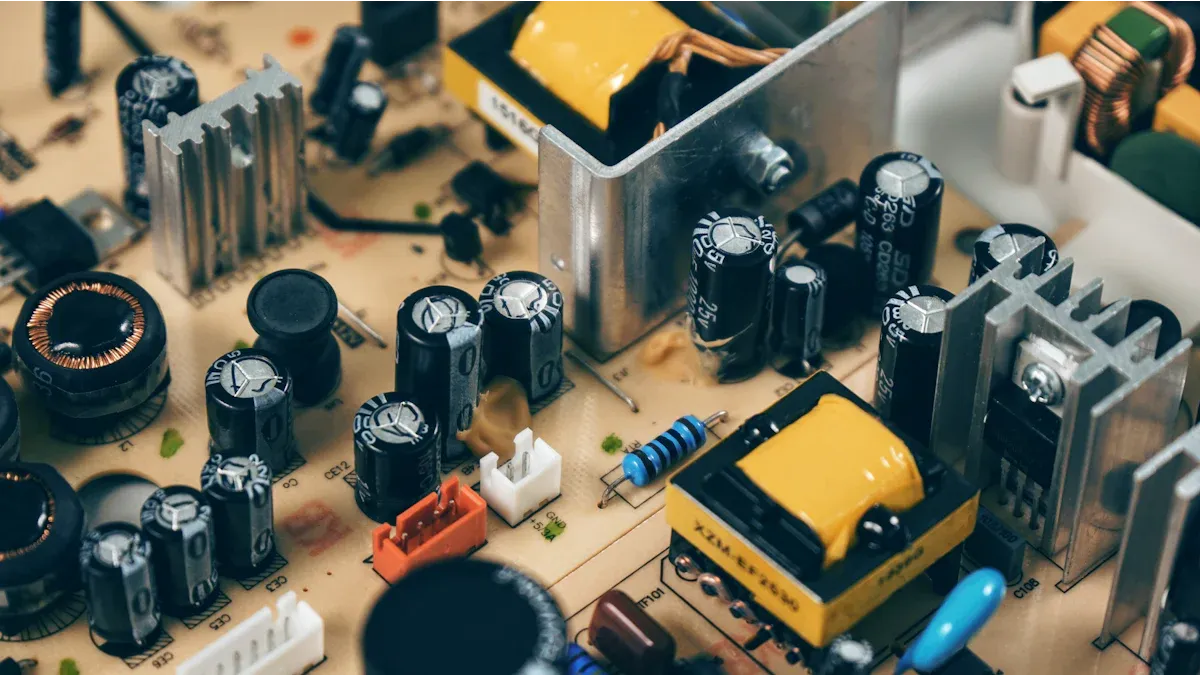
Capacitors play a vital role in urban utilities, ensuring efficient operation and reliability in critical infrastructure. Their applications span public transportation, communication networks, and smart grids, making them indispensable for modern cities.
Public Transportation and Electrification
Capacitors enhance the efficiency of public transportation systems by supporting electrification. They store and release energy rapidly, which is crucial for electric trains, buses, and trams. This capability reduces energy losses during acceleration and braking, improving overall system efficiency. Capacitors also stabilize voltage levels in electrified railways, ensuring smooth operation and reducing wear on equipment. As cities adopt electric vehicles and expand public transit networks, capacitors will remain essential for sustainable urban mobility.
Communication Networks and 5G Infrastructure
Capacitors are critical in communication networks, particularly in 5G infrastructure. They maintain signal integrity and power stability, ensuring uninterrupted connectivity. The demand for high-performance capacitors has grown due to advancements in telecommunications and the miniaturization of electronic devices. Capacitors in 5G applications offer high capacitance, excellent frequency response, and low energy losses.
-
Capacitors support the shift toward sustainable energy systems and wireless communication infrastructure.
-
Miniaturized capacitors meet the needs of compact, efficient devices.
-
Their role in 5G technologies highlights their importance in modern communication systems.
The increasing reliance on capacitors reflects their significance in powering the next generation of communication technologies.
Street Lighting and Smart Grids
Capacitors improve the efficiency of street lighting systems by stabilizing voltage and reducing power losses. They enable smart grids to manage energy distribution effectively, integrating renewable energy sources and ensuring reliable power delivery. Power factor correction capacitors are particularly important in urban utilities, as they enhance power quality and stabilize voltage.
|
Aspect |
Details |
|---|---|
|
Application Area |
Power factor correction capacitors manage power quality and stabilize voltage in urban utilities. |
|
Importance |
Essential for efficient power transmission and distribution, especially with renewable energy integration. |
|
Future Trends |
Demand will rise with the transition to smart grids and distributed energy resources. |
Capacitors are foundational to the modernization of urban utilities, supporting energy-efficient and sustainable operations.
Capacitors and Infrastructure Efficiency
Reducing Energy Losses in Distribution Systems
Capacitors play a crucial role in reducing energy losses in power distribution systems. By compensating for reactive power, they improve the efficiency of electrical networks. This reduces the amount of energy wasted during transmission. Capacitor banks, for example, are widely used to optimize power factor in distribution systems. This optimization minimizes energy losses and enhances the overall performance of the grid.
In addition, capacitors stabilize voltage levels, ensuring consistent energy delivery to end users. This stability prevents overloading and reduces the risk of power outages. As a result, capacitors contribute to more reliable and efficient energy systems. Their applications in distribution networks are essential for meeting the growing demand for electricity in urban and industrial areas.
Enhancing System Reliability and Longevity
Capacitors enhance the reliability and longevity of infrastructure by stabilizing power systems and protecting equipment. They absorb voltage fluctuations and prevent damage to sensitive components. This protection extends the lifespan of electrical devices and reduces maintenance costs. Capacitors also ensure uninterrupted operation in critical systems, such as renewable energy storage and industrial machinery.
Research confirms the importance of capacitors in improving system reliability. For instance, studies have analyzed the reliability of capacitors in various applications, including electric vehicle charging modules and wind turbine systems. These findings highlight their role in maintaining system performance and extending operational lifespans.
|
Study Title |
Authors |
Year |
Findings Summary |
|---|---|---|---|
|
Lifetime prediction and reliability analysis for aluminum electrolytic capacitors in EV charging module based on mission profiles |
Liu H, Qiu J, Zhang W, Zhang M, Dou Z, Chen L |
2023 |
This study predicts the lifetime and analyzes the reliability of capacitors in electric vehicle charging modules, confirming their role in enhancing longevity. |
|
Reliability of capacitors for dc-link applications in power electronic converters—An overview |
Wang H, Blaabjerg F |
2014 |
Provides an overview of capacitor reliability in dc-link applications, emphasizing their importance in system reliability. |
|
Lifetime prediction of dc-link capacitors in multiple drives system based on simplified analytical modeling |
Wang H, Huang S, Kumar D, Wang Q, Deng X, Zhu G, et al. |
2021 |
Discusses lifetime predictions for dc-link capacitors, supporting their reliability in multiple drive systems. |
|
Reliability analysis of capacitors in voltage regulator modules with consecutive load transients |
Zhao Z, Zhou D, Davari P, Fang J, Blaabjerg F |
2021 |
Analyzes the reliability of capacitors under load transients, highlighting their critical role in maintaining system performance. |
|
Reliability evaluation of power capacitors in a wind turbine system |
Zhou D, Blaabjerg F |
2018 |
Evaluates the reliability of power capacitors in wind turbine systems, reinforcing their contribution to system longevity. |
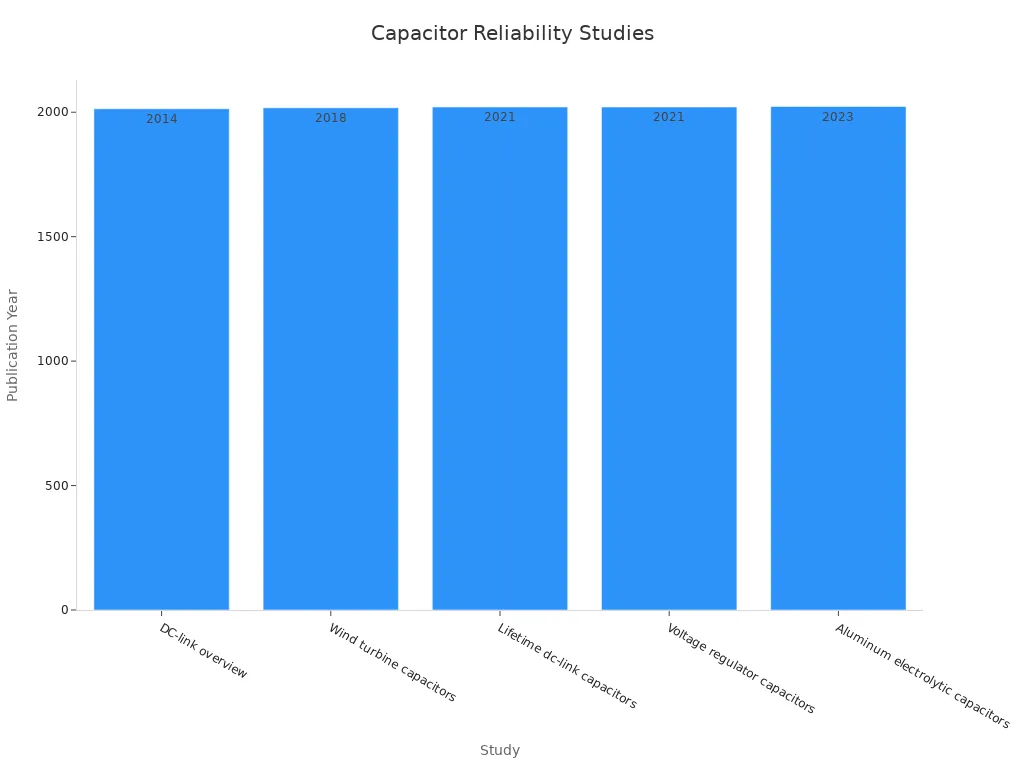
Supporting Sustainable Development Goals
Capacitors support sustainable development goals by improving energy efficiency and enabling renewable energy storage. Their ability to reduce energy losses aligns with global efforts to minimize carbon emissions. Capacitors also facilitate the integration of renewable energy sources into power grids. This integration ensures a steady energy supply while reducing reliance on fossil fuels.
In urban infrastructure, capacitors contribute to the development of smart grids and energy-efficient systems. These advancements promote sustainable urbanization and help achieve environmental targets. Capacitors are indispensable in creating a greener and more sustainable future.
Capacitors remain essential for advancing industrial and urban infrastructure. Their applications in energy systems, machinery, and utilities ensure efficient operations and sustainable development. Forecasts highlight their growing importance in future technologies.
|
Factor |
Description |
|---|---|
|
Increasing Demand for High-Power Electronics |
The rise in electric vehicles, renewable energy, and smart grids is increasing the need for capacitors that can manage high voltages and currents, driving market growth. |
|
Continuous improvements in capacitor technology, including higher capacitance and better stability, are expanding their applications and enhancing market growth. |
|
|
Stringent Environmental Regulations |
New regulations promoting energy efficiency and renewable energy adoption are creating opportunities for capacitors in voltage stabilization and power factor correction, further boosting market demand. |
As technology evolves, capacitors will continue to play a pivotal role in meeting energy demands and supporting infrastructure modernization. Their ability to adapt to emerging trends ensures their relevance in shaping a sustainable future.
What is the primary function of a capacitor in energy systems?
Capacitors store and release electrical energy to stabilize voltage and improve power quality. They reduce energy losses, enhance efficiency, and support renewable energy integration. Their role ensures reliable and sustainable energy distribution.
How do capacitors contribute to energy efficiency in manufacturing?
Capacitors optimize power factor by compensating for reactive power. This reduces energy waste and lowers electricity costs. They also stabilize voltage, ensuring machinery operates efficiently and reliably, which minimizes downtime and maintenance.
Why are capacitors essential for renewable energy systems?
Capacitors store excess energy from renewable sources like solar and wind. They release this energy during demand peaks, ensuring a steady power supply. This capability supports grid stability and enhances the reliability of renewable energy systems.
How do capacitors improve public transportation systems?
Capacitors provide rapid energy storage and discharge, which is crucial for electric trains and buses. They reduce energy losses during acceleration and braking. This improves efficiency, stabilizes voltage, and extends the lifespan of transportation equipment.
What role do capacitors play in smart grids?
Capacitors enhance smart grids by stabilizing voltage and managing power quality. They integrate renewable energy sources and reduce energy losses in distribution systems. This ensures efficient and reliable energy delivery in urban infrastructure.
See Also
Harnessing ARTESYN NPT42-M For Enhanced Industrial Automation
Three Key Innovations of ATIC83E2 In Industrial Automation
Discover Three Major Impacts Of XCF01SVOG20C On Automation
Unveiling The Essential Automotive Features Of FREESCALE MCF5251CVM140
A Deep Dive Into MC9S12DJ256MFUE Specifications For Automotive Use
